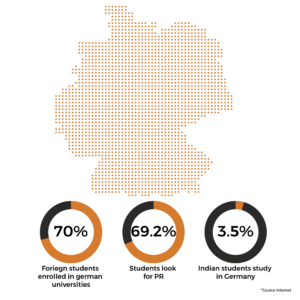
GERMANY
Around 3 lakh international students study in Germany at one time out of which in addition to around 15,000 are Indian students alone .
Germany is Europe’s most industrialized and populous country . An area of 3,57,022 square kilometers makes it the seventh largest country in Europe . Germany has a population of around 82 million people and its largest city is Berlin which is also its capital .
Famed for its technological and scientific achievements, it has also produced some of Europe’s most celebrated composers, philosophers and poets.
Economy
Germany is the largest economic giant of Europe and ranks fourth as the largest economy by nominal GDP in the world.
The economy of the country is based on the concept of social market economics . Germany has one of the most skilled workforce in Europe especially in its major industries including car manufacture, chemicals, household equipment and machinery . Germany is also the 3rd largest agricultural producer in Europe and helps in it catering to 90% of its nutritional needs. It’s economic freedom score is 74.2, as a result making its economy the 25th freest in the 2018 Index .
Why study in Germany?
Recently, Germany is becoming the educational hub for international students from all over the world . So, some of the reasons for the same are :
-
Germany provides excellent teaching and research , ranking among the best in the world .
-
Whether it be day or night , you can move around freely In Germany with no problem at all which makes Germany a safe country.
-
With lakhs of international students studying in Germany , it provides the much needed diversity .
-
German Universities provide outstanding academic programs to all its students . Universities of applied sciences offer a range of attractive, practice-oriented programs . Many study programs combine theory and practice which greatly facilitates your career start.
-
Many of the German Universities have incorporated an international study program in their curriculum where lectures from all around the world come to share their expertise.
-
College education in Germany is free for everyone (even for international students) : tuition fees for bachelor’s degrees in public universities was abolished in because it was thought that to pay for higher education is ‘socially unjust’.
Interesting facts about Germany:
-
Germany boasts some of world’s most famous inventions – the light bulb, the automated calculator, and the automobile is Germany’s giving to the world . The Germans are also credited for the discovery of insulin, the invention of the clarinet, the pocket watch, television (partly), paraffin, petrol/gasoline & Diesel engines, the automobile engine, differential gear ,the motorcycle, the jet engine, the LCD screen and the Walkman.
-
The education system of Germany produces top performers .
-
Germany has high levels of employment– in 2016, more than half of people aged 15–64 had a paid job (43.3m people) and unemployment dipped to a record low of 4.2 percent. Youth unemployment was also one of the lowest in the EU at 7.7 percent.
-
German is the Europe’s largest economy
-
Germany is one of the world’s largest car producers
-
Germany is a leader in climate and energy policies
-
Its literacy rate at 99% ranks it in top 20 among 215 countries.
Living and accommodation costs in Germany
-
The living cost is quite reasonable in Germany as compared to other European countries . The prices for food , clothing and accommodation are in line with the European average.
-
Students will require around 850 Euros a month to cover the cost of living in Germany .However depending on the location and other factors , the cost may vary.
-
Depending on the location of your University, you will pay between 210 and 360 euros per month for accommodation.
Work after study in Germany
Germany has a great work after study policy for its international students. However to avail the opportunity , students must be well-aware of the visa rules and policies under which they can work in Germany after their studies are over .
- Contact https://www.myedugate.in/ to know all about getting a work permit in Germany.
Top 5 Universities in Germany are:
- Technische Universität München
- Ludwig-Maximilians – Universität München
- Ruprecht-Karls-Universität Heidelberg
- Karlsruher Institut für Technologie
- Humboldt-Universität zu Berlin
- 3 German Universities made it to the top 100 in the QS-World Rankings 2018 .
- Moreover, 45 German Universities have made it to the world’s best (top 1000) in the QS-World Rankings 2018 .
When to apply ?
For most public universities in Germany , the application period for the winter semester begins in early May and ends mid-July. For the summer intake, the application period is between early December and mid-January. Therefore you should expect to receive a formal acceptance or rejection letter in approximately 1 to 2 months after the deadline .
- Entry Requirements: to know about the specific entry requirements suiting to your needs and merits , visit https://www.myedugate.in .
